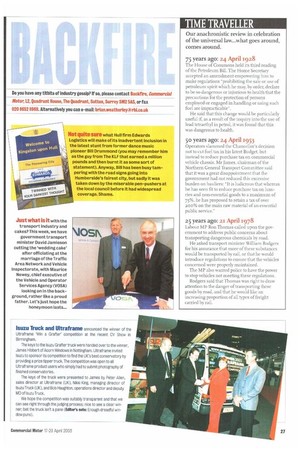TIME TRAVELLER
Page 27

If you've noticed an error in this article please click here to report it so we can fix it.
Our anachronistic review in celebration of the universal law...what goes around, comes around.
75 years ago: 24 April 1928
The House of Commons held its third reading of the Petroleum Bill. The Home Secretary accepted an amendment empowering him to make regulations "prohibiting the sale or use of petroleum spirit which he may, by order, declare to be so dangerous or injurious to health that the precautions for the protection of persons employed or engaged in handling or using such fuel are impracticable".
He said that this change would be particularly useful if, as a result of the inquiry into the use of lead tetraethyl in petrol, it was found that this was dangerous to health.
50 years ago: 24 April 1953 Operators slammed the Chancellor's decision not to cut fuel tax in his latest Budget, but instead to reduce purchase tax on commercial vehicle chassis. Mr James, chairman of the Northern General Transport Committee said that it was a great disappointment that the government had not reduced this excessive burden on hauliers: "It is ludicrous that whereas he has seen fit to reduce purchase tax on luxuries and non-essential goods to a maximum of 75%, he has proposed to retain a tax of over 200% On the main raw material of an essential public service."
25 years ago: 21 April 1978
Labour MP Ron Thomas called upon the government to address public concerns about transporting dangerous chemicals by road.
He asked transport minister William Rodgers for his assurance that more ofthese substances would be transported by rail, or that he would introduce regulations to ensure that the vehicles concerned were properly maintained.
The MP also wanted police to have the power to stop vehicles not meeting these regulations.
Rodgers said that Thomas was right to draw attention to the danger of transporting these goods by road, and that he would like an increasing proportion of all types of freight carried by rail.
































































































































































